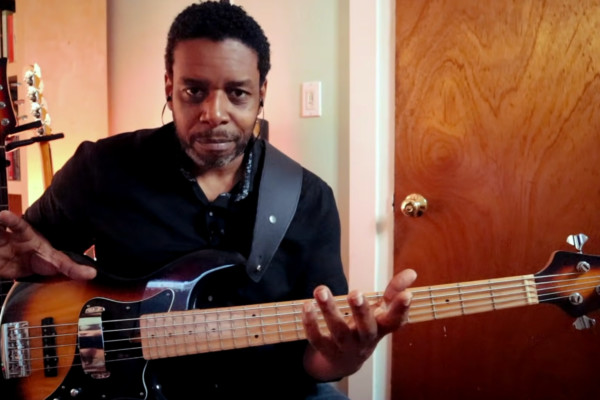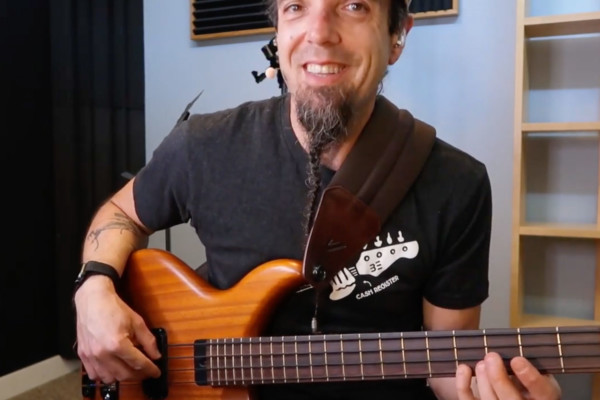Ask Damian Erskine: Your Own Voice
Q: I’m trying to grow, but its like I’ve hit the wall. I’m trying to play like a bass player is slipping away from me. I try to play for everyone, but it’s hard to find my own “voice” in the song. I find myself trying to play stuff where it doesn’t fit. How do i dig deeper than I am? Like learning the vocabulary of my instrument? I’m struggling on how to find my own style of play and still please the crowd and myself. Any easy suggestions?
A: It sounds like you’re asking about how to further develop your playing and find your own voice. First, I want to make mention of a few things you said.
As far as keeping the crowd interested in what you are playing goes… The audience is generally happiest when players are putting the song before anything. You mentioned looking for a lick that could keep the crowd going. In fact, licks are the last thing you should worry about. Anthony Jackson, Will Lee, Tim LeFevre… these guys all play the hell out of the bass line and don’t worry about the flash. They’ll only play something if they hear it first and feel like it might help propel the tune or add some energy to the moment. I want to talk about this because I come across a lot of young players who are more concerned with flash, licks and blazing runs and wind up ruining a lot of potential musical moments trying to force this lick or that lick into a space where it would be best left to breathe. Sometimes the best thing for the musical moment is space and you have to honor that.
Now, if you’re primarily a church player and playing a lot of gospel music there is a tendency to want to shine (especially at a shed!). Todays gospel musicians are some of the hippest and most capable players out there. If you really take a look at who’s getting the big gigs, though, it’s the guys like Andrew Gouche, Joel Smith, Terrance Palmer, Rawbiz, Justin Raines, etc. These guys can not only really sing with their instruments, but they put the pocket first! When Gouche plays a lick, it’s not something he had spent all week in the shed working up, it’s a line he hears and has to get out there! Listen to Nate Watts with Stevie Wonder… Busy player, but everything serves the song and he’s singing with that bass! There’s zero fluff…
This is all to say. In my opinion, the BEST thing you could focus on is this.
- Expand your vocabulary!
- Don’t play anything extra unless you REALLY feel it.
In order to expand your vocabulary, you can do any number of things:
- Start transcribing lines of other players
- Start transcribing non-bass players! (Stevie Wonder melodies, horn solos, etc.. anything that perks your ear.. figure it out!
- Don’t just learn the notes but really look at what chord the line is being played over and how it interacts with it. Why did that note sound so good right there?
- Learn how to make chords and explore chord structures
- Buy a Real Book and play through jazz changes
- Get a book of Bach Cello suites and learn those!
- Learn to read music
- Make sure you really know those scales and chords. Can you play them anywhere on the neck starting from any note in the scale with any finger, or do you need to be hitting it from the same angle each time to play it?
- Are there common types of turn-arounds and chord changes you hear in the music you play? Learn them! Practice them in every which way you can think of practicing them.
You need to really understand the language of music if you wish to speak it with authority. Whether you know it by ear, by theory, whatever – learn it in the way that best suites you (not the easiest way, just the way that works best for you).
Ultimately, you want to get to a place where you have an infinite number of things you could think of to play here, but have the maturity to listen to the music first and decide what needs to be there.
Again, it’s a different story if you’re at a shed or a jam where everybody’s trading licks. Then you can let it fly and have fun, but if you’re playing music with a full band, the music should come before your ego.
The last ting I wanted to mention has to do with your last sentence: You asked if there was any “easy suggestions”
In short, no! Remember this, if you want to be a great musician, you have to be willing to do the work. When you practice, do you only play things that you can already play well?
That’s not practicing!! That’s noodling, which is cool. Do that, too. But make sure to really practice daily.
If you aren’t making mistakes and pushing your brain, fingers, and ideas when practicing, you’re doing it wrong!
The greatest put in thousands of hours working to understand music and their instruments. Those hours were spent working, not fiddling or trying to come up with that one lick that would blow everyone away.
Basically, get in the shed and make sure you break a sweat! Work some stuff out, challenge yourself and, once you’ve met the challenge, challenge yourself to work on something else.
Make sure every step is a step forward and you’re on the right path!
Have a question for Damian Erskine? Send it to [email protected]. Check out Damian’s instructional books, Right Hand Drive and The Improviser’s Path.



